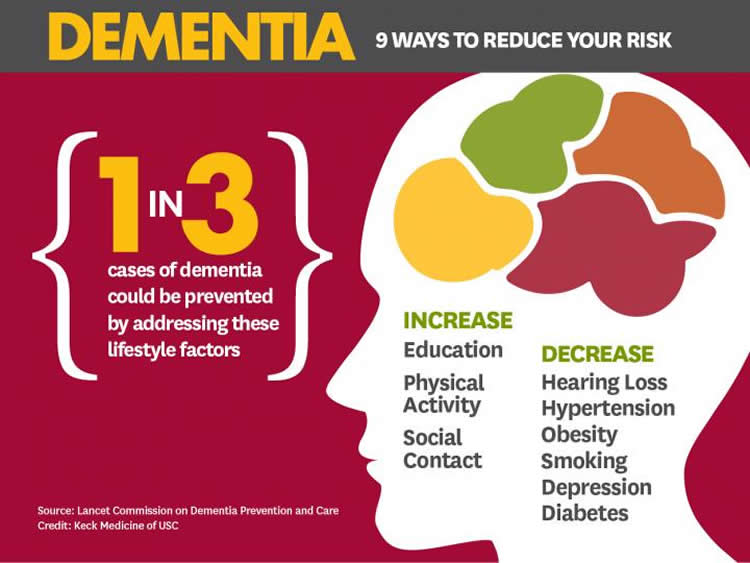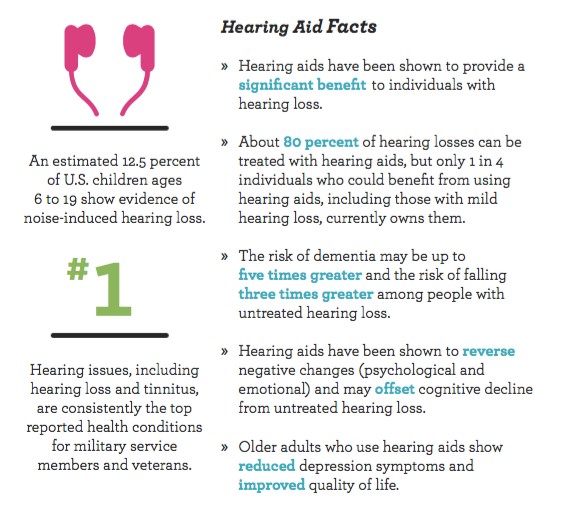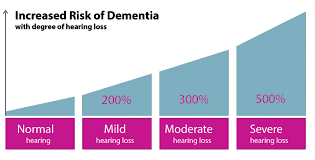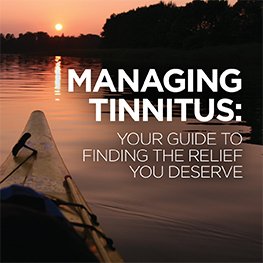The Connection Between Memory, Dementia, Hearing Loss, Hearing Aids & Diet

“If your ears can no longer pick up on as many sounds, your hearing nerves will send fewer signals to your brain. As a result, the brain declines.”
Hearing loss and dementia are both more common as you get older. The latest research shows that’s no coincidence. The two are linked.
Scientists are finding more and more evidence that trouble with hearing makes you more likely to go on to have dementia, a condition marked by memory loss and trouble with thinking, problem-solving, and other mental tasks.
That doesn’t mean that people with hearing loss (about two-thirds of adults over 70) are guaranteed to have dementia — simply that the odds are higher. There may be things you can do to lower your chances for mental decline, even if you start to have trouble hearing.
What’s the Link?
Scientists have found that a person’s chances for mental decline seem to go up the worse their hearing problems are. In one study, mild, moderate, and severe hearing loss made the odds of dementia 2, 3, and 5 times higher over the following 10-plus years.
And it seems to happen faster. Studies of older adults who had lost some hearing found that they had mental decline 30%-40% faster, on average. Looked at another way, they had the same mental decline in 7.7 years, on average, as someone with normal hearing showed in 10.9 years.
Researchers don’t know for sure how the two conditions are connected. Frank Lin, MD, PhD, of Johns Hopkins University, says three things may be involved:
- People with hearing loss tend to feel isolated, since it’s hard to join in conversations or be social with others when you can’t hear. Some research has shown a link between feeling lonely or isolated and dementia. So hearing loss may make mental decline happen faster than it would otherwise.
- Your brain has to work harder to process sound if you don’t hear well. That may take away resources that it could use for other important activities.
- If your ears can no longer pick up on as many sounds, your hearing nerves will send fewer signals to your brain. As a result, the brain declines.
“It’s likely a combination of all three,” says Lin, who has done much of the research on the connection between the conditions.
Hearing loss and dementia
A study from Johns Hopkins Hospital found that older adults with untreated hearing loss are significantly more likely to develop dementia than those with normal hearing. Hearing loss is associated with accelerated cognitive decline in older adults.
Some experts believe that hearing aids use may potentially help.
Those with moderate to severe hearing loss are up to 5 times more likely to develop dementia.
Major health studies have found that older adults with hearing loss, particularly males, are more likely to develop Alzheimer’s disease and dementia, compared to those with normal hearing. Males with hearing loss are 69 percent more likely to develop dementia compared to those with normal hearing.
The risk of dementia escalates as a person’s hearing loss worsens. Those with mild hearing impairment are nearly twice as likely to develop dementia compared to those with normal hearing. The risk increases 3 times for those with moderate hearing loss, and 5 times for those with severe impairment.
Every 10-decibel increase in hearing loss increases the risk for dementia by 20%. For those above the age of 60, 36% of their dementia risk is associated with hearing loss.

Hearing loss and Alzheimer’s – what’s the connection?
Studies suggest that hearing loss causes brain changes that raise the risk of dementia.
Brain shrinkage – When the “hearing” portion of the brain grows inactive, it results in tissue loss and changes in brain structure, creating the first link between hearing loss and Alzheimer’s disease.
Studies show that the brains of people with hearing loss shrink or “atrophy” more quickly than the brains of people with normal hearing.
Brain overload – An “overwhelmed” brain creates the second link between hearing loss and dementia. When it’s difficult to hear, the brain must work overtime just to understand what people are saying. Straining to hear all day, every day, depletes a person’s mental energy and steals brain function needed for other crucial functions like remembering, thinking, and acting. This can further set the stage for Alzheimer’s, dementia and other cognitive disorders.
Hearing loss and social isolation
The third link between hearing loss and Alzheimer’s is social isolation. A study by The National Council on the Aging (NCOA) of 2,300 hearing impaired adults found that people with untreated hearing loss are more likely to experience loneliness, worry, depression, anxiety, and paranoia—and are less likely to join organized and casual social activities.
When a person withdraws from life, their risk for dementia intensifies.
In short, the less we stimulate our brains by interacting with other people, places, and things—and the less we use our brains to hear and listen—the more quickly our brains decline, putting us at greater risk for dementia.
Hearing aids can help prevent dementia.
Numerous studies show that hearing aids not only improve a person’s hearing—they also help preserve a person’s independence, mental abilities, emotional and physical health, and work, home, and social lives. A full, happy life keeps your brain active.
Early identification and treatment of a potential hearing loss helps minimize risks later in life.

Hearing aids can help those who have Alzheimer’s.
If a loved one is showing signs of dementia, help them get their hearing checked sooner than later. Sometimes, un-diagnosed hearing loss symptoms are thought to be Alzheimer’s symptoms when they’re really not.
For those with Alzheimer’s, hearing loss can aggravate symptoms. A hearing impairment makes it difficult to listen, reply, and respond to verbal cues. It escalates feelings of confusion, isolation, and paranoia.
Hearing aids can help relieve Alzheimer’s symptoms, and several styles are easy for a person with cognitive impairment to use. An American Journal of Epidemiology study found that hearing aids slowed the rate of memory decline and improved the quality of life for Alzheimer’s patients with hearing loss.
Adopt a Healthy Diet

In addition to correcting for hearing loss by the wearing of hearing aids, eating a heart-healthy diet benefits both your body and your brain. In general, this is a diet that is lower in saturated fats. Research in the area of the relationship between diet and cognitive functioning is somewhat limited, but it does point to the benefits of two diets in particular: the DASH (Dietary Approaches to Stop Hypertension) diet and the Mediterranean diet. These diets can help reduce heart disease and may also be able to reduce risk of dementia.
Studies suggest that the consumption of curcumin (tumeric) in our daily diet may also have a positive impact on various chronic diseases and degenerative conditions like Alzheimer’s.
Brain-Training
I am seeing new brain-training products on the market attempting to keep our brains sharp. May I suggest “better hearing”. The evidence is – that memory, dementia, and hearing loss—especially untreated hearing loss are connected.
As stated previously – Research indicates that when people with untreated hearing loss strain to hear, they have more difficulty remembering what they heard. Researchers believe this has to do with what is called “cognitive load”. In order to compensate, people with untreated hearing loss draw on mental resources that they would have normally used to remember what was just said.
For more information on better hearing or hearing aids, visit HearSource.com or call 1-800-416-2434, 9:00 a.m. to 9:00 p.m. Eastern Time (6:00 a.m. to 6 p.m. Pacific Time) USA.





This Post Has One Comment
An excellent article. Very good information on the link between dementia, diet and hearing loss.